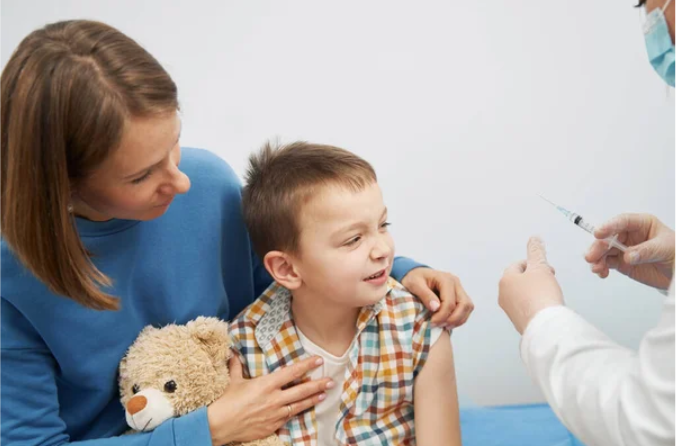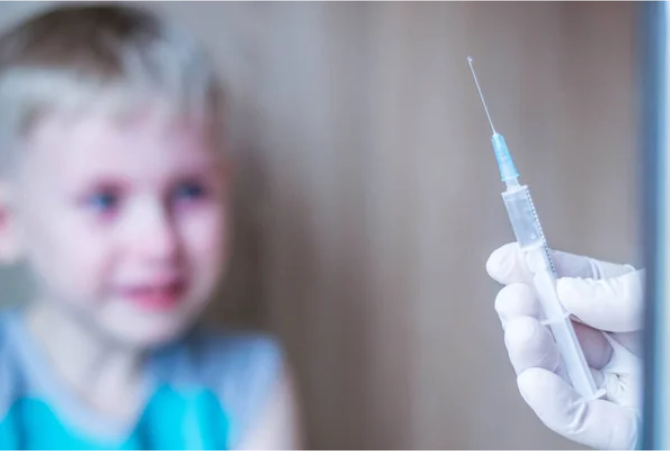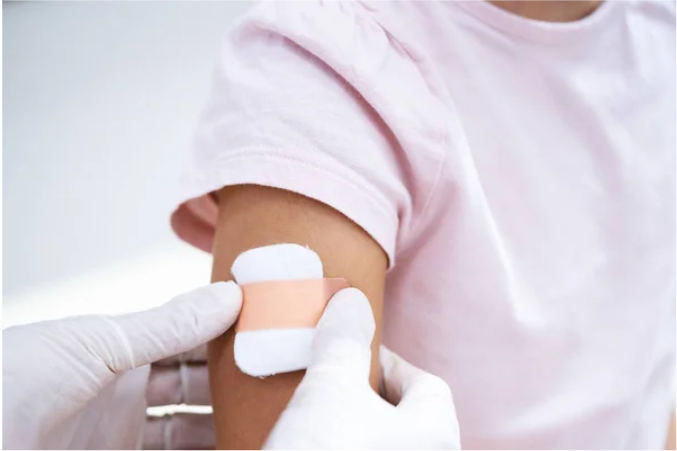How to Talk to Your Child About Vaccines and Sickness
As a parent, one of your top priorities is keeping your child healthy and safe. An essential part of that is ensuring they receive recommended vaccinations to protect against serious diseases. However, with so much information—and misinformation—circulating about vaccines these days, it can be challenging to know how to approach the subject with your kids.
That’s where this comprehensive guide comes in. We’ll walk you through everything you need to know to have positive, productive conversations with your children about vaccines and illness. From addressing common fears and misconceptions to age-appropriate ways of explaining how vaccines work, we’ve got you covered.
At Entirely Kids Pediatrics, an experienced Frisco pediatrician understands the importance of clear communication when it comes to your child’s health. We believe that informed parents lead to healthier, happier kids. Whether you’re preparing for your child’s first immunization or discussing booster shots with your teenager, this guide will provide you with the tools you need to navigate these crucial conversations.
Why It’s Important to Talk About Vaccines
Before we get into the nitty-gritty of how to talk to your child about vaccines, let’s briefly touch on why these conversations are so crucial:
- Vaccines save lives. Childhood immunizations have drastically reduced the incidence of once-common and often deadly diseases like measles, polio, and whooping cough. By vaccinating your child, you’re protecting them from these serious illnesses.
- Misinformation is rampant. The internet is rife with anti-vaccine propaganda that can scare parents and kids alike. Having open, honest discussions about vaccines helps combat this misinformation and ensures your child is getting accurate facts from a trusted source—you!
- It establishes healthy habits. Talking to your child about the importance of vaccines lays the foundation for a lifetime of proactive health care. It normalizes preventive measures and teaches them to prioritize their well-being.
Early vaccinations play a vital role in building a strong immune foundation, which is a key aspect of Newborn Care to ensure your child’s health from the very beginning.
Now that we’ve established the why, let’s move on to the how.
Tips for Age-Appropriate Vaccine Conversations

The way you approach the vaccine conversation will vary depending on your child’s age and maturity level. Here are some tips for tailoring your talk to different age groups while discussing the childhood immunization schedule:
Toddlers and Preschoolers (Ages 2-5)
At this age, keep explanations very simple and concrete. Focus on the immediate, tangible benefits of vaccines rather than abstract concepts. You might say something like:
- “This quick pinch helps keep you from getting very sick.”
- “The vaccine is like a superhero shield that protects your body from bad germs.”
Use a calm, reassuring tone and plenty of positive reinforcement. Reward brave behavior with small treats or stickers.
School-Aged Children (Ages 5-12)
Kids in this age range are more capable of understanding basic information about how vaccines work. Use clear, age-appropriate language to explain:
- Vaccines contain weakened or dead germs that train the immune system to fight off the real disease.
- They may cause mild side effects like soreness or low fever, but this means they’re working.
- Vaccines are rigorously tested and continuously monitored for safety.
Encourage your child to ask questions, and address any misconceptions they may have picked up from friends or media. Emphasize that while shots can be scary, they’re a normal part of staying healthy—just like brushing teeth or wearing a seatbelt.
Teenagers (Ages 13+)
Teens are prone to believing they’re invincible, so they may question the necessity of vaccines. Appeal to their growing sense of social responsibility by discussing:
- How vaccines not only protect the individual, but also vulnerable members of the community through herd immunity
- The dangers of vaccine-preventable diseases and the historical toll they took before widespread immunization
- The rigorous scientific process behind vaccine development and approval
Encourage them to think critically about information they encounter online. Point them toward reputable sources like the CDC and WHO where they can further research vaccines on their own.
Addressing Common Fears and Concerns
Regardless of age, many children (and adults!) have fears and reservations when it comes to vaccines. Here’s how to address some of the most common ones:
“Vaccines are painful.”
It’s true that shots can hurt in the moment—there’s no denying that. However, try to reframe the temporary discomfort as a sign of the vaccine doing its job. You might say:
- “It’s okay to be scared of the pinch. The pain means your body is busy building up protection against germs.”
- “Think of it like a workout for your immune system. Just like sore muscles after exercise, the achiness is proof that you’re getting stronger and healthier.”
Offer comfort measures like holding their hand, counting to three before the injection, or planning a fun treat for afterwards. Remind them that the pain will be over quickly, but the protection lasts a long time.
“Vaccines make you sick.”
This is a persistent myth that stems from a kernel of truth. Vaccines can cause mild, short-lived side effects like low-grade fever or soreness at the injection site. However, these symptoms are not the same as having the actual disease. Explain:
- “The vaccine isn’t giving you the illness—it’s just getting your immune system ready to fight it off if you ever encounter the real thing.”
- “Feeling a little under the weather after a vaccine is like a practice fire drill. Your body is preparing itself to put out a real fire in the future.”
On a related note, some children may worry that they can catch a disease from someone who was recently vaccinated against it. Assure them that this isn’t possible with the vaccines in use today.
“Vaccines have scary ingredients.”
With the rise of “clean eating” and organic everything, it’s understandable that kids (and parents) might balk at the chemical-sounding ingredients in some vaccines. However, it’s important to emphasize that:
- These ingredients are present in minuscule amounts and serve important purposes like preserving the vaccine’s stability and effectiveness.
- Many of the scariest-sounding ingredients are actually found naturally in the body or in common foods. (For example, formaldehyde occurs naturally in fruits and is even produced by human metabolism.)
- Each ingredient is exhaustively studied and proven safe through rigorous testing.
If your child is especially concerned about a particular ingredient, don’t hesitate to discuss it with your pediatrician. They can provide additional context and reassurance.
What to Do If Your Child Refuses Vaccines

If your child is old enough to voice their opinion on vaccines, there’s a chance they may refuse to get them altogether. This can be a tricky situation to navigate, but here are some tips:
Validate their feelings.
Even if you disagree with your child’s stance, it’s important to let them feel heard. Say something like, “I understand that you’re scared/skeptical/confused about vaccines. Let’s talk through your concerns together.”
Explore their reasoning.
Ask your child to articulate exactly why they’re opposed to vaccines. Is it a fear of needles? Concern over side effects? Misinformation they read online? Understanding their perspective can help you address their hesitations more effectively.
Present facts calmly.
Once you know where your child is coming from, share reputable information to counter any misconceptions they may have. Stick to objective, evidence-based sources like scientific studies and statements from major medical organizations.
Find a compromise.
If your child remains resistant, see if you can find a middle ground. For example, you might agree to space out their vaccinations over a longer period rather than getting them all at once. Or you could offer to let them choose which arm receives the shot. Small accommodations can make a big difference in their willingness to cooperate.
Know when to seek help.
If your child’s fear or refusal of vaccines is severely impacting their healthcare, don’t hesitate to enlist the help of a pediatrician or child therapist. Dr. Leung can provide additional support and guidance to help your child overcome their vaccine hesitancy.
Modeling a Positive Attitude
As with so many aspects of parenting, your child will take cues from your own behavior and attitudes about vaccines. If you approach the subject with confidence and optimism, they’re more likely to follow suit. Here are some ways to model a positive vaccine mindset:
- Get vaccinated yourself. Make sure you’re up to date on your own immunizations, and let your child see you getting shots without fear.
- Speak positively about vaccines. Instead of dwelling on potential side effects or pain, highlight the incredible power of vaccines to prevent disease and keep communities healthy.
- Educate yourself. The more knowledgeable you are about how vaccines work and their safety and efficacy, the more confidently you can discuss them with your child. Stay current on the latest vaccine recommendations and research.
- Encourage vaccination in others. Normalize vaccines by talking about them with friends, family members, and other parents. Volunteer or donate to organizations that promote vaccine awareness and accessibility.
By walking the walk and not just talking the talk, you send a powerful message to your child about the importance and value of vaccines.
Handling Vaccine Anxiety

Even with all the preparation and positive modeling in the world, some kids may still feel anxious about getting vaccinated. Here are some strategies for managing those pre-shot jitters:
Practice deep breathing.
Teach your child a simple deep breathing exercise they can use to calm their nerves before and during the injection. For example, have them inhale slowly through the nose for a count of four, hold for four, then exhale through the mouth for four. Repeat several times.
Use distraction techniques.
Bring along a favorite book, toy, or game to keep your child’s mind occupied while they’re waiting for their turn. During the shot itself, try singing a silly song together or playing “I Spy” to divert their attention.
Offer a reward.
Positive reinforcement can go a long way in helping kids overcome their vaccine fears. Let your child pick out a small treat or toy to enjoy after their appointment, or plan a fun outing together to celebrate their bravery.
Consider pain-reducing medications.
If your child is especially sensitive to pain or has had a tough time with shots in the past, ask your pediatrician about giving them a dose of acetaminophen or ibuprofen before the appointment. These over-the-counter medications can help ease discomfort and reduce the risk of fever or soreness afterwards.
Talking About Illness Prevention
Of course, vaccines are just one piece of the illness prevention puzzle. It’s also important to teach your child about other ways they can stay healthy and avoid getting sick. Here are some key topics to cover:
Hand hygiene
Regular hand washing is one of the most effective ways to prevent the spread of germs. Teach your child to wash their hands thoroughly with soap and water for at least 20 seconds:
- Before eating or preparing food
- After using the bathroom
- After blowing their nose, coughing, or sneezing
- After touching animals or handling pet food/waste
- After playing outside or in public spaces
Respiratory etiquette
Teach your child to cover their mouth and nose with a tissue when they cough or sneeze, then throw the tissue away and wash their hands. If a tissue isn’t available, they should cough or sneeze into their elbow rather than their hands.
Avoiding germ sharing
Encourage your child not to share items that come into contact with their mouth or face, like cups, utensils, or lip balm. Teach them to avoid touching their eyes, nose, or mouth, especially when their hands aren’t clean.
Staying home when sick
Explain to your child that staying home from school or activities when they’re not feeling well helps prevent spreading germs to others. Assure them that rest is important for their body to heal and that they won’t miss out on too much by taking a sick day.
Healthy habits
Emphasize the role that overall healthy habits play in strengthening the immune system and preventing illness. Encourage your child to:
- Eat a balanced diet rich in fruits, vegetables, and whole grains
- Get plenty of physical activity and outdoor play
- Aim for 9-12 hours of sleep per night (depending on age)
- Manage stress through relaxation techniques, hobbies, and social support
Leading by example is key here. Make these habits a priority for the whole family, and your child will naturally follow suit.
Talking About Specific Illnesses

In addition to general illness prevention strategies, it’s a good idea to educate your child about specific diseases they may encounter—especially those that can be prevented by vaccines. Here are some tips for discussing common childhood illnesses:
Use age-appropriate language.
When explaining diseases to younger children, keep it simple and avoid overly technical terms. For example, you might describe the flu as “a bad cold that can make you feel really tired and achy.” With older kids and teens, you can go into more detail about symptoms, transmission, and potential complications.
Emphasize prevention.
Whenever you discuss a specific illness, be sure to highlight the ways your child can protect themselves and others. Remind them of the importance of vaccines, handwashing, and staying home when sick. If the disease has a vaccine available, take the opportunity to reinforce why getting immunized is so crucial.
Be honest but reassuring.
It’s important not to downplay the seriousness of certain diseases, but you also don’t want to unnecessarily frighten your child. Strike a balance by providing accurate information while emphasizing that most kids who get sick will recover just fine with proper care. Reassure them that you, along with their doctor, are there to help keep them healthy and safe.
Conclusion
Talking to your child about vaccines and illness can feel daunting, but it doesn’t have to be. By approaching the subject with age-appropriate language, empathy for their concerns, and a focus on evidence-based information, you can help your child develop a positive, proactive relationship with their health.
Remember, every child is unique, so tailor these tips to your family’s needs. And don’t hesitate to lean on your pediatrician for backup—they’re a wealth of knowledge and support when it comes to communicating with kids about vaccines and illness. Contact us today at (469) 425-3600 to schedule an appointment.
Frequently Asked Questions
At what age should I start talking to my child about vaccines?
It’s never too early to start. You can begin simple conversations about health and protection as soon as your child starts asking questions, typically around age 2-3. Adjust the complexity of your explanations as they grow older.
How do I explain vaccines to my child without scaring them?
Focus on the positive aspects. Describe vaccines as “superhero shields” that protect their body. Emphasize that while there might be a brief moment of discomfort, vaccines help keep them strong and healthy.
My child is afraid of needles. How can I help them overcome this fear?
Acknowledge their feelings and offer comfort. Use distraction techniques during the shot, like counting, singing, or watching a video. Consider using numbing creams to reduce pain, and always praise their bravery afterward.
How should I respond if my child asks why they got sick despite being vaccinated?
Explain that while vaccines greatly reduce the risk of getting certain illnesses, they don’t provide 100% protection. Emphasize that if they do get sick, the vaccine often helps make the illness less severe.
What’s the best way to talk to my teenager about the importance of vaccines?
Appeal to their sense of social responsibility. Discuss concepts like herd immunity and how vaccines protect not just them, but also vulnerable members of the community. Encourage them to research from reputable sources and form their own educated opinions.
